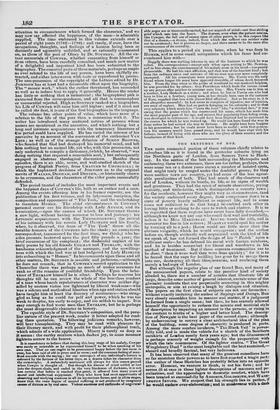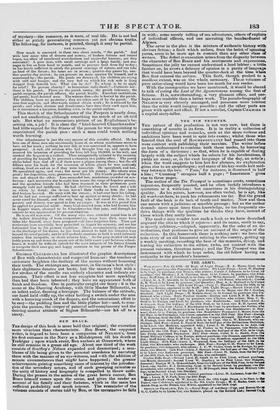THE SKETCHES OF BOZ.
THE more connected portion of these volumes chiefly relates to suburban life as it is found in the genteeler suburbs lying on the Northern parts of London, from Somers Town to Hack- ney. In the section of the belt surrounding the Metropolis and embracing these two extremes, there are (ormates, perhaps, there were some ten or a dozen years since) a number of isolated spots, that might truly be ranged under the doubtful genus; for they were neither town nor country, yet had some of the less agree- able peculiarities of both. They had much of the closeness and dirt of London, without its bustle, its life, or its signs of wealth and greatness. They had the spirit of minute observation, prying curiosity, and tittle-tattle, which distinguishes a country town ; for the residents, however they might vary in circumstances, (and the variety embraced every degree, from competence down to a state of poverty barely sufficient to support life, and in some cases not sufficient to do that long,) resembled each other in having little or nothing to do save to watch and chatter. It is to be regretted that these regions have never been fully described,— although we know not any one who could do it well and truthfully, unless it be Miss MARTINEAU. IRVING wants the pith, and is moreover too fine in his notions; la ARRISAT would spoil his matter by turning all to a jest ; Hoox would see little more than the obvious vulgarity, which he would exaggerate; and the author before us, though evidently well acquainted with the kind of life we speak of, has not formed the design of his " Parish" upon a sufficient scale--he has debased his metal with foreign mixtures, and he is besides somewhat too literal and wiredrawn in his method of treatment. But if these separate communities are to be done, "then it were well they were done quickly ;" for it is to be feared that the rage for building has gone far to merge them into one, destroying all their idiosyncracies, and rendering them merely a bad copy of London. But although the regular plan of our friend Boz, and many of the unconnected papers, relate to the peculiar kind of society alluded to, there are a number of articles that illustrate life at large, describe some matter of general interest, narrate some of the gloomier incidents that are perpetually occurring in this mighty metropolis, or aim at raising a laugh by dialogue and situation. The papers on the first class of subjects are not our favourites : without exactly imitating the author of Sayings and Doings, Boz very closely resembles him in manner and matter, if a judgment be formed from a single scene; but then, he has scarcely allowed himself the opportunity to redeem the minute and material style of description by imparting an interest to the persons, or rising in the context to truths of a higher and better kind. The descrip- tion of Newgate is the best paper of the second class; although by endeavouring to convey a clear architectural idea of the plan of the building, some degree of obscurity is produced in parts. Among the more sombre incidents, " The Black Veil" is power- fully told, and is made the vehicle for a sketch of the Southern outskirts of London nearly forty years ago; but the denouement is perhaps scarcely of weight enough for the preparation with which the tale commences. Of the lighter stories, "The Great Winglebury Duel" is the most laughable and the best sustained,— absurd and broadly farcical, but very ludicrous. It has been observed that many of the greatest comedians have so far mistaken their powers as to have first enacted a tragic part: the author of these Sketches has probably fallen into an opposite error. Humour, we venture to think, is not his forte ; and be seems ill at ease in those lighter descriptions of manners and pe- culiarities, and the appendages to domestic comfort, which have been treated so successfully by ADDISON, GOL nod ITH, and Wass.- INGTON lavteus). We suspect that his strength lies in pathos, if he would esollew over-alabomtien ; awl la sombreness with a dash of mystery—the romance, as it were, of real life. Ile is not bad either at pithily generalizing common yet not obvious truths. The following, for instance, is pointed, though it may be partial.
THE PARISH.
How much is conveyed in these two short words, " the parish." And with how many tales of distress and misery, of broken fortune and ruined hopes, too often of unrelieved wretchedness and successful knavery, are they associated ! A poor man, with small earnings and a large family, just ma- nages to live on from band to mouth, and to procure food from day today; he has barely sufficient to satisfy the present cravings of nature, and can take no heed of the future ; his taxes are in arrear ; quarter-day passes by, ano- ther quarter-day arrives: he can procure no more quarter for himselt, and is summoned by—the parish. His goods are distrair ed, his children are crying with cold and hunger, and the very bed on which his sick wife is lying dragged from beneath her. What can he do? To whom is he to apply for relief? To private charity? to benevolent individuals ?—Certainly nut : there is his parish. There are the parish vestry, the parish iufirmary, the parish surgeon, the parish-officers, the parish beadle. Excellent institutions, and gentle, kind-hearted men. The woman dies—she is buried by the parish. The children have no protector ; they are taken care of by the parish. The man first neglects, and afterwards cannot obtain work ; he is relieved by the parish ; and when distress and drunkenness have done their work upon him, he is maintained a harmless, babbling Whit, in the parish asylum.
This sketch of the Schoolmaster of the Paupers is neatly done, and not unaffecting, although something too much of an oft-tokl tale. But what an unconscious picture of an Englishman's be- setting sin, a job ! It is clear the "kind-hearted Churchwarden" had little regard for the fitness of the person he was appointing to superintend the parish poor: such a man could teach nothing worth learning.
Our schoolmaster is just the very reverse of this amiable official. He has been one of those men one occasionally hears of, on whom misfortune seems to have set her mark ; nothing he ever did, or was concerned in, appears to have prospered. A rich old relation who had brought him up, and openly an- nounced his intention of providing for him, left him 10,0001. in his will, and revoked the bequest in a codicil. Thus unexpectedly reduced to the necessity of providing for himself, he procured a situation in a public office. The young clerks below him died off as if there were a plague among them ; but the old fellows over his head, for the reversion of whose places he was anxiously waiting, lived on and on as if they were immortal. He speculated, and lost. He speculated again, and won ; but never got his money. His talents were great; his disposition, easy, generous, and liberal. His friends profited by the one and abused the other. Loss succeeded loss, misfortune crowded on mis- fortune: each successive day brought him nearer the verge of hopeless penury, and the quondam friends who bad been warmest in their professions grew strangely cold and indifferent. He had children whom be loved and a wife on whom he doted: the foNner tun e I their backs on him, the latter died broken-hearted. He went with the stream ; it had ever been his failing, and he had not courage sufficient to bear up against so many shocks: he had never cared for himself, and the only being who had cared for him in his poverty and distress was spared to him no longer. It was at this period that he applied for parochial relief. Some kind-hearted man, who had known him in happier times, chanced to be Churchwarden that year, and through his interest he was appointed to his present situation. He is an old man now. Of the many who once crowded round him in all the hollow friendship of boon companionship, some have died, some have fallen like himself, some have prospered—all have forgotten him. Time and misfortune have mercifully been permitted to impair his memory, and use has habituated him to his present condition. Meek, uncomplaining, and zealous in the discharge of his duties, he has been allowed to hold his situation long beyond the usual period; and he will no doubt continue to hold it until infirmity. renders him incapable, or death releases him. As the gray-headed old man feebly paces up and down the sunny side of the little court .yard between school- hours, it would be difficult indeed fur the most intimate of his former friends to recognize their once gay and happy associate in the person of the Pauper Schoolmaster.
GEORGE CRUIKSHANK has illustrated the graphic descriptions of Boz with characteristic and congenial humour: the touches of caricature heighten the drollery of the scenes without lessening their truth. The etchings are, moreover, in GEORGE'S best style: their slightness denotes not haste, but the mastery that with a few strokes of the needle can embody character and indicate ex- pression. Their effect is not less complete but more sparkling than had they been laboured ; they have an appearance both of finish and freedom. One in particular caught our fancy : it is the scene at the Dancing Academy, with little Master Billsmethi, as an infant sailor, dancing a hornpipe. The balance of the attitude, one hand held stiffly up, the other holding a switch under the arm with a knowing crook of the fingers, and the ostentatious effort to be easy—the pudding face and the little platter hat—and, to com- plete the picture, the simper of paternal self-complacency and the dancing-master attitude of Signor Billsmethi—are hit off to a nicety.



























 Previous page
Previous page